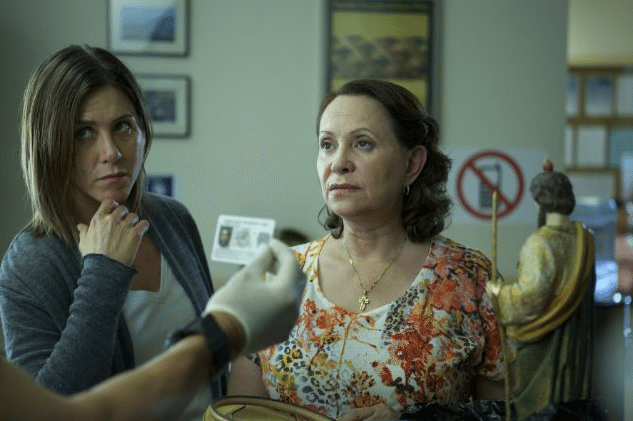
 Cake follows Claire (Jennifer Aniston); a woman who, in struggling to piece her life back together after a traumatic experience, finds herself oddly obsessed with the suicide of Nina (Anna Kendrick), whom she met in her support group. Almost as a way to distract herself from her own torment, she befriends Nina’s husband (Sam Worthington) and son (Evan O'Toole) and they form a makeshift family – each of the parts taking solace in a single, grieving, whole.
Cake follows Claire (Jennifer Aniston); a woman who, in struggling to piece her life back together after a traumatic experience, finds herself oddly obsessed with the suicide of Nina (Anna Kendrick), whom she met in her support group. Almost as a way to distract herself from her own torment, she befriends Nina’s husband (Sam Worthington) and son (Evan O'Toole) and they form a makeshift family – each of the parts taking solace in a single, grieving, whole.
Claire is the kind of person who during challenging times throws herself at everything in pursuit of comfort. She’s manipulative and assertive, though, we sort of forgive her because she’s clearly broken. Along for the ride is the ceaselessly charming Silvana (Adriana Barazza), Claire’s caretaker. There are moments of pure charm with Aniston and Barazza together, but certainly not enough to distract from the fact that Cake is very much a redundant look at psychological trauma. Patrick Tobin’s script feels like vignettes strung together that never quite coalesce into a visceral or meaningful whole.
Claire is sharp-witted, brutal but sometimes likable, but most importantly, pitiable. We’re able to latch onto her with relative ease, eager to learn what it is that’s made her this way, and how she’ll claw her way out of it. (The most exciting part of Cake is truly Jennifer Aniston getting to explore new territory). In the first act, there’s hope for Claire. The film is set up to make good on the happiness that hope promises, however, once hope starts to dwindle, both Claire and the audience are just left feeling depressed. Tobin sort of forces change upon Claire, much like pulling a lever and jerking a car seat forward, instead of letting it develop organically. Claire is different by the end of the film, but her transformation is abrupt and assumed.
As the credits roll, we’re still left with a multitude of unanswered questions. Tobin leans a little too heavily on his vague aesthetic, and we don’t ever learn the specifics of what happened to her and her son. It’s referred to a bit tritely as “the accident,” and William H. Macy makes a brief cameo as the apparent doer of “the accident.” (Mind you, being vague about atrocity is plenty welcome in narrative. That being said, in this instance Cake’s vagueness distracts a bit from the emotional essentials). The inclusion of several scenes, including an overlong trip to Tijuana, seem like they were engineered with intent to develop character but only further confuse the story. There are moments that suggest that Silvana is terribly unhappy being Claire’s caretaker, and we’re almost led to believe that her decision to quit the job is imminent. There are several proverbial “guns” like this one that are introduced early on and never fired by the film’s conclusion. Cake feels like a missed opportunity to really examine psychological trauma, sort of in the way that Her examined the idea of love last year. Instead of breaking out the emotional microscope, Cake spends its 104 minutes showing us sad people who ultimately do very little other than appear sad.